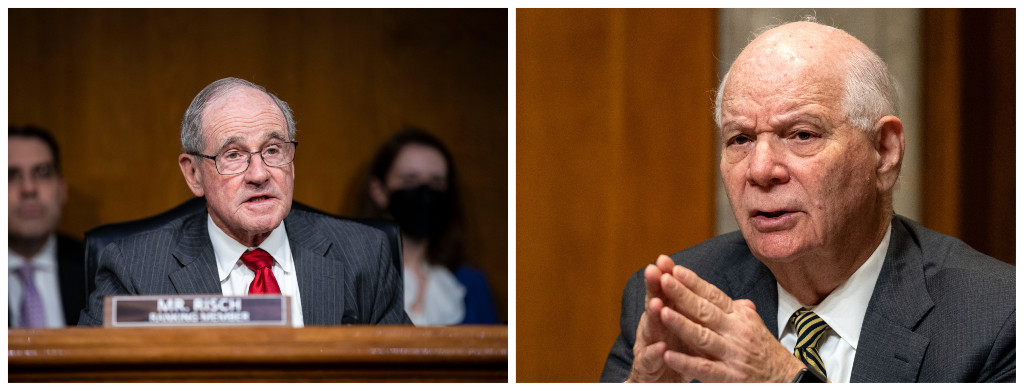
During a business meeting this upcoming Wednesday, the Senate Foreign Relations Committee will consider legislation that would impose financial and travel sanctions on an expansive number of people and organizations, potentially including key U.S. allies, in the name of condemning the International Criminal Court (ICC).
Legislative background
The Illegitimate Court Counteraction Act (ICCA) – introduced by Rep. Chip Roy (R-TX) in the House (H.R.8282) and in similar form by Senator Tom Cotton (R-AR) in the Senate (S.4484) – was passed by the House in June. Roy had introduced an earlier version of the bill weeks before the ICC Prosecutor Karim Khan announced that he was applying for arrest warrants against top Israeli officials and Hamas leaders. The House passed an updated version of the bill just over two weeks after Khan’s announcement. A total of 42 Democrats voted in favor, while the Biden administration issued a statement of opposition to the bill. (Note: some news outlets had mistakenly reported earlier that Secretary Tony Blinken expressed support for sanctions.)
Since then, the legislation has been a source of paralysis on the Senate Foreign Relations Committee. The top Republican on the committee, Sen. Jim Risch (R-ID), refused to proceed with committee work, including nominations for unrelated executive branch positions, until Chairman Ben Cardin (D-MD) agreed to move forward with the ICCA.
Status of ICC proceedings
The Prosecutor’s applications for arrest warrants are currently pending before the ICC’s Pre-Trial Chamber (PTC). The PTC can decide to issue some, none, or all of the warrants that the Prosecutor has requested. The PTC has taken an unusual step of inviting amicus briefs, which resulted in a flurry of submissions, including opposition to the arrest warrants by Germany, the United States (see Marty Lederman’s analysis of the U.S. legal objections), and others. As recently as Friday, the Government of Israel filed two briefs contesting the arrest warrants. The PTC may provide the Prosecutor an opportunity to respond to Israel’s briefs before the judges reach a decision.
Even after warrants are issued in a case, there is a lengthy set of procedural steps to be undertaken before anyone faces trial.
The ICC does not have its own police force, and so securing custody of any suspect requires the cooperation of States that support the ICC. Once custody is secured, the suspect makes an initial appearance before the Court, and is able to apply for interim release. Around 6 months to a year later, there will be a confirmation of charges hearing and some months after that, the PTC will decide whether to confirm the charges and then set a date for trial.
Risks associated with the proposed legislation
As explained in detail in an earlier article by Adam Keith, the current version of the ICCA would sweep unfathomable numbers of lawyers, judges, investigators, administrators, and other civil servants at the ICC in its net of mandatory financial and travel sanctions. The sanctions would even extend to the spouses, children, parents and siblings of those sanctioned.
Moreover, the range of civil and criminal liabilities that U.S. law provides for pursuing anyone who engages with a sanctioned person, means the net is cast further still. People and organizations, including U.S. persons, who contribute to the Court’s work – even on situations like Ukraine, which has strong bipartisan support from both the Biden administration and Congress – may be at risk.
As Ambassador (ret.) Todd Buchwald has explained in Just Security, “I humbly submit that the imposition of such sanctions would be a mistake of classic proportions.” Drawing from the experience of the Trump administration sanctions against the ICC, Buchwald writes: “[T]he sanctions had an impact opposite of what the United States wanted.” Buchwald also draws from interviews conducted for a report published three years ago by a Task Force commissioned by the American Society of International Law (ASIL) – which he co-chaired with now-Ambassador for Global Criminal Justice Beth van Schaack.
Readers may also be interested in the powerful remarks on the bill by Rep. Jason Crow (D-CO):
The work of the Senate Foreign Relations Committee is, of course, vital to the conduct of U.S. foreign affairs and the standoff over the ICCA has contributed to a stalled nominations process for a slew of appointments. During its meeting on Wednesday, the Committee will consider eleven nominees ranging from positions such as the U.S. Ambassadors to Moldova and to Libya, to the U.S. representative on the executive board of the World Health Organization.
For further background:
IMAGE: (L) Ranking member of the Senate Foreign Relations Committee U.S. Sen. Jim Risch (R-ID) speaks during a Senate Foreign Relations Committee hearing on April 26, 2022 in Washington, DC (Photo by Al Drago-Pool/Getty Images); (R) Chairman Sen. Ben Cardin (D-MD) speaks a Senate Foreign Relations Committee hearing on May 21, 2024 in Washington, DC. (Photo by Kent Nishimura/Getty Images)
This post was originally published on this site be sure to check out more of their content.








